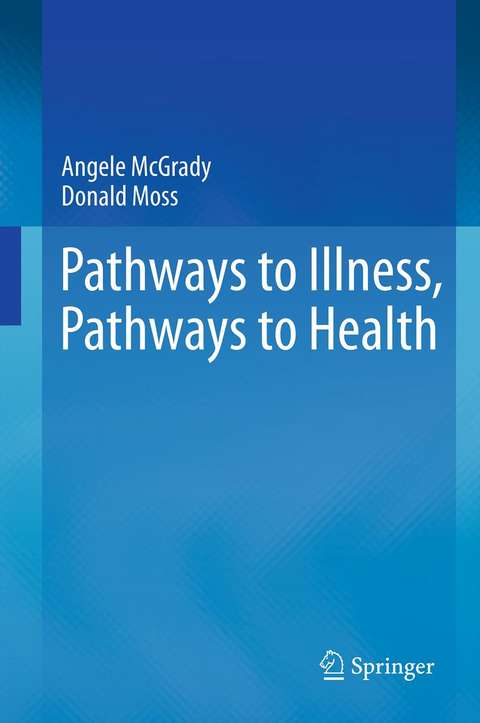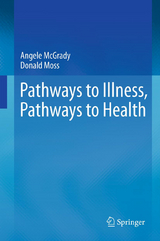Pathways to Illness, Pathways to Health
Springer-Verlag New York Inc.
978-1-4419-1378-4 (ISBN)
For example, the section on "Applications to common illnesses: metabolic disorders of behavior: diabetes, hypertension, and hyperlipidemia"considers the confluence of genetics, behavior, and maladaptive mind body interactions to produce the metabolic syndrome. Then the personal and professional assessments are described to establish the baseline for recommending treatment while fully engaging the patient. Finally, multilevel interventions are formulated for these disorders. The plan begins with clinician guided self care recommendations to re-establish the normal rhythm of appetite and satiety. The next level of interventions consists of skill building techniques, such as relaxation and imagery. Lastly, psychotherapy and advanced applied psychophysiological interventions are detailed. Case examples are used throughout to illustrate the pathways to illness, the turning points, and the pathways to health. From the patients’ viewpoints, the pathways metaphor is a motivator. The patient is guided to understand the paths that led to illness. Subsequently, the patient becomes empowered by the pathways framework to begin to make choices that lead to health.
Angele McGrady received her B.S. from Chestnut Hill College in Philadelphia, her Masters in Physiology from Michigan State University, and her Ph.D. in Biology from the University of Toledo. Later she returned to complete a Masters in Guidance and Counseling. She is a licensed Professional Clinical Counselor and is certified by the Biofeedback Certification Institute of America. Currently Dr. McGrady is a professor and Director of Medical Education in the Department of Psychiatry at the University of Toledo. Dr. McGrady’s professional activities include: Past President of the Association for Applied Psychophysiology and Biofeedback and Associate Editor of the international (Springer) journal Applied Psychophysiology and Biofeedback. Dr. McGrady lectures locally and nationally on topics related to stress and chronic illness, and biofeedback. In 1997, she was honored with the Dean’s Award for Teaching Excellence. Recently, she developed a wellness series for first year medical students. The project is funded by the David and Lura Lovell Foundation and is now in its second year. Her curriculum vita lists 55 publications and eleven book chapters. She has co-edited one book, Handbook of Mind-Body Medicine for Primary Care (Sage, 2003). In March 2000, Dr. McGrady received the Distinguished Scientist Award from the Association for Applied Psychophysiology and Biofeedback. Donald Moss, Ph.D. is the Director of Integrative Health Studies at Saybrook Graduate School in San Francisco, and is a partner in the Psychological Services Center in Grand Haven Michigan. He is Editor of the Biofeedback Magazine, Associate Editor for the journal Applied Psychohysiology and Biofeedback and consulting Editor for the Journal of Neurotherapy, Psychophysiology Today and the Journal of Phenomenological Psychology. Dr. Moss has over 50 publications in the fields of psychophysiology, biofeedback and mind-body therapies,including an edited book (Handbook of Mind Body Medicine for Primary Care, Sage, 2003). He has given lectures and workshops on these topics throughout the world, including recent presentations at the Association for Applied Psychophysiology and Biofeedback, the International Association for Cognitive Psychotherapy, the National Autonomous University of Mexico, and the Biofeedback Foundation of Europe. He is also past president of AAPB.
Part 1: Basic Concepts of Health and Illness.- Introducing the Pathways Model.- Genetic Etiology of Illness.- Psychosocial Etiology of Illness.- Psychophysiological Etiology of Illness.- Assessment in the Pathways Model.- Interventions in the Pathways Model.- Part 2: Applications to Common Illnesses.- Substance Abuse Disorders.- Depression and Anxiety.- Diabetes and Obesity.- Hypertension and Syncope.- Headache and Back Pain.- Fibromyalgia.- Gastrointestinal Disorders.- Sleep Disorders.- Part 3: Personalizing the Path to Health and Wellness.- Simple Pathways to Health and Wellness.- Developing a Wellness Plan.- Seeking Professional Help.
| Zusatzinfo | XIV, 263 p. |
|---|---|
| Verlagsort | New York, NY |
| Sprache | englisch |
| Maße | 155 x 235 mm |
| Themenwelt | Geisteswissenschaften ► Psychologie ► Sozialpsychologie |
| Medizin / Pharmazie ► Gesundheitswesen | |
| Medizin / Pharmazie ► Medizinische Fachgebiete ► Psychiatrie / Psychotherapie | |
| Studium ► Querschnittsbereiche ► Prävention / Gesundheitsförderung | |
| Schlagworte | Anxiety • Asthma • Back pain • changing bad habits • changing health behavior • Diabetes • digestive disorders • Fibromyalgia • genetic predisposition • genetics of behavior • Headache • Health Behavior • health-related decision making • Hyperlipidemia • Hypertension • impulse control • maladaptive behavior • Metabolic disorders • mind-body interactions • Obesity • Pain • Pathways to Health • pathways to illness • positive psychology • Psychobiologie • psychobiology • Psychoneuroimmunology • Psychopathologie • Psychophysiology • self-care • Sleep Disorders • stress management • substance abuse |
| ISBN-10 | 1-4419-1378-5 / 1441913785 |
| ISBN-13 | 978-1-4419-1378-4 / 9781441913784 |
| Zustand | Neuware |
| Haben Sie eine Frage zum Produkt? |
aus dem Bereich




